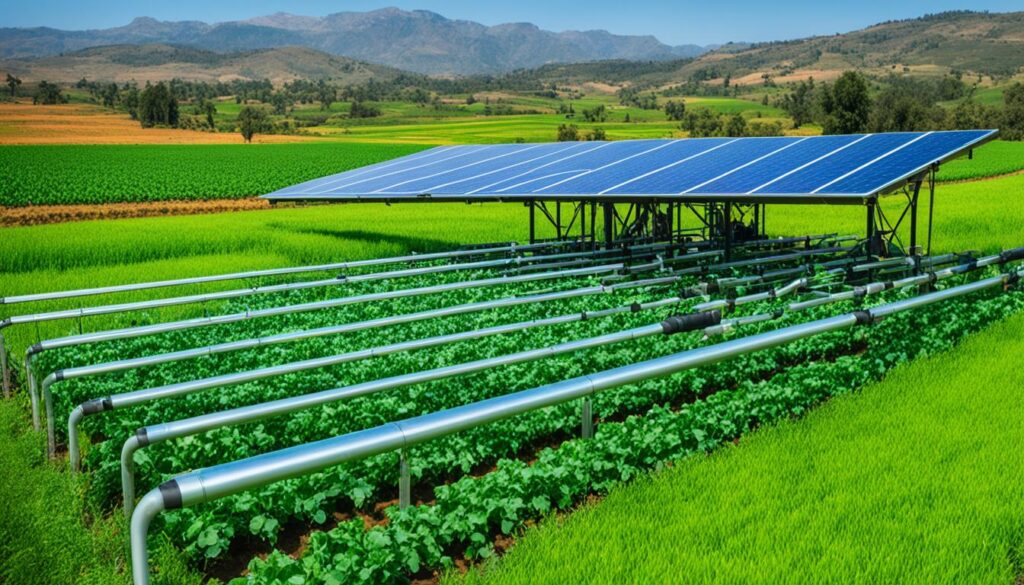India is taking significant steps towards sustainable growth and reducing carbon footprints, as evident in its recently submitted long-term Low Emission Development Strategy to the United Nations Framework Convention on Climate Change (UNFCCC). With agriculture contributing almost 20% to India’s GDP, the implementation of eco-friendly irrigation systems has become crucial. Solar water pumps are emerging as a sustainable solution, harnessing renewable energy for farming and promoting efficient water management. Solar Water Pumps for Agriculture…
Key Takeaways:
- Solar water pumps offer reliable and cost-effective solutions for agriculture.
- They reduce the burden of electricity subsidy and diesel consumption in farming.
- Solar-powered irrigation systems increase farmers’ income and reduce groundwater overuse.
- The government has introduced schemes like PM-KUSUM to promote the adoption of solar pumps.
- By harnessing renewable energy, solar water pumps contribute to sustainable farming practices.
Advantages of Solar Water Pumps for Agriculture
Solar water pumps offer numerous advantages for efficient water management in agriculture, making them an ideal choice for eco-friendly irrigation systems. Let’s explore the key benefits of using solar-powered pumps:
- Cost-effective: Solar water pumps utilize the abundant and free energy from the sun, eliminating the need for expensive electricity or fossil fuels. This significantly reduces operational costs for farmers and promotes sustainable farming practices.
- Long lifespan and minimal maintenance: Solar pumps have a long lifespan, ensuring durability and reliability. With minimal maintenance requirements, farmers can save time, effort, and expenses associated with traditional pumps.
- Eco-friendly: Unlike conventional pumps that rely on diesel or electricity, solar water pumps produce zero emissions during operation. By harnessing renewable energy, farmers can contribute to mitigating climate change and reducing their carbon footprint.
- Reliable water supply: Adequate water supply is critical for crop growth. Solar water pumps ensure a consistent and reliable water supply, even in areas without access to the grid. This leads to efficient water management for farms and enhances agricultural productivity.
- Off-grid water pumping solutions: Solar pumps are an excellent off-grid solution, allowing farmers in remote areas to access water for irrigation without relying on centralized electricity. This enables sustainable agricultural practices in off-grid locations.
The advantages of solar water pumps for agriculture are clear, ranging from cost-effectiveness and eco-friendliness to reliable water supply and off-grid water pumping solutions. By embracing solar-powered irrigation systems, farmers can optimize water management on their farms and contribute to a greener and more sustainable future.
| Advantages of Solar Water Pumps for Agriculture |
|---|
| Cost-effective |
| Long lifespan and minimal maintenance |
| Eco-friendly |
| Reliable water supply |
| Off-grid water pumping solutions |
Types of Solar Water Pumps and the PM-KUSUM Scheme
When it comes to solar water pumps for agriculture, there are two main types: submersible pumps and surface pumps. Submersible pumps are specifically designed to pump water from wells or boreholes, while surface pumps are ideal for extracting water from lakes, rivers, or other surface water sources.
Both submersible and surface solar water pumps offer farmers sustainable water solutions by harnessing the power of renewable energy. These pumps are available in both AC and DC models, allowing farmers to choose the most suitable option for their needs.
One significant initiative introduced by the government of India is the PM-KUSUM scheme, which stands for Pradhan Mantri Kisan Urja Suraksha evam Utthaan Mahabhiyan. This scheme aims to promote the use of solar pumps in agriculture and encourage the adoption of eco-friendly irrigation systems.
Under the PM-KUSUM scheme, farmers have the option to replace their existing diesel-powered pumps with solar pumps in off-grid areas. Additionally, farmers with grid-connected pumps can solarize their existing pumps, thus reducing their dependency on fossil fuels and transitioning to renewable energy for farming.
The PM-KUSUM scheme is a crucial step towards achieving energy security for farmers and reducing carbon emissions in the agricultural sector. Furthermore, by increasing the share of non-fossil fuel-based power in the country, this scheme contributes to sustainable water solutions and a greener economy.

Benefits of the PM-KUSUM Scheme:
- Energy security for farmers
- Reduction in carbon emissions
- Promotion of renewable energy for farming
- Decreased reliance on fossil fuels
- Leveraging solar energy for sustainable water solutions
Conclusion
Solar water pumps for agriculture have emerged as a game-changer in the field of irrigation. By harnessing the power of renewable energy, these eco-friendly irrigation systems offer a sustainable solution for farmers. The advantages they bring, including cost-effectiveness, reliability, and improved water management, contribute to the growth and profitability of farming operations.
With the support of government initiatives like the PM-KUSUM scheme, the adoption of solar water pumps in agriculture is rapidly increasing. This commitment to renewable energy for farming not only reduces operating costs but also ensures a greener and more sustainable future.
By embracing solar water pumps, farmers can reduce their dependency on traditional energy sources and decrease their carbon footprint. This shift towards renewable energy not only benefits individual farmers but also contributes to India’s vision of a resilient and environmentally conscious agricultural sector.
The integration of solar water pumps marks a significant step toward achieving sustainable water solutions in agriculture. With their reliability, efficiency, and eco-friendly nature, these pumps are revolutionizing the way farmers approach irrigation. The future of agriculture in India is being shaped by solar water pumps, which play a vital role in sustainable farming practices and the promotion of a greener economy.
FAQ
What are the advantages of using solar water pumps for agriculture?
Solar water pumps offer several advantages for agriculture. They are cost-effective alternatives to traditional pumps as they use solar energy, which is free and abundant. Solar pumps have a long lifespan and require minimal maintenance, reducing operational costs. They are eco-friendly, emitting no harmful pollutants. Solar water pumps also ensure reliable water supply, which is crucial for crop growth, and they can be used in off-grid areas. Additionally, solar-powered irrigation helps in efficient water management for farms and reduces the overuse of groundwater.
What are the different types of solar water pumps and how do they work?
There are two main types of solar water pumps: submersible pumps and surface pumps. Submersible pumps are used to pump water from wells or boreholes, while surface pumps are used to pump water from lakes, rivers, or other surface water sources. These pumps are available in both AC and DC models. They operate by converting solar energy into mechanical energy, which is used to pump water. The choice of pump depends on the water source and the specific requirements of the farm.
What is the PM-KUSUM scheme and how does it promote the use of solar water pumps in agriculture?
The PM-KUSUM (Pradhan Mantri Kisan Urja Suraksha evam Utthaan Mahabhiyan) scheme is a government initiative in India aimed at promoting the use of solar pumps in agriculture. Under this scheme, farmers can replace their existing diesel-powered pumps with solar pumps in off-grid areas, or they can solarize their existing grid-connected pumps. The scheme aims to provide energy security for farmers, reduce carbon emissions, and increase the share of non-fossil fuel-based power in the country. It provides financial support and subsidies to farmers to encourage the adoption of solar-powered irrigation systems.
How do solar water pumps contribute to sustainable farming practices?
Solar water pumps have the potential to revolutionize irrigation practices in agriculture by providing a cost-effective and environmentally friendly solution. By harnessing renewable energy, farmers can reduce operating costs, increase profitability, and improve water management on their farms. Solar-powered irrigation helps to reduce the overuse of groundwater, conserve water resources, and reduce the carbon footprint of agriculture. The government’s support through schemes like PM-KUSUM is driving the adoption of solar pumps in agriculture, leading to sustainable farming practices and a greener economy.
Can solar water pumps be used in off-grid areas?
Yes, solar water pumps are an ideal solution for off-grid areas. They do not rely on a stable electricity supply or diesel fuel, as they operate using solar energy. This makes them a reliable and independent source of power for irrigation purposes in remote or off-grid locations. Solar water pumps provide farmers in these areas with access to a consistent and sustainable water supply, contributing to the development of agriculture in such regions.

